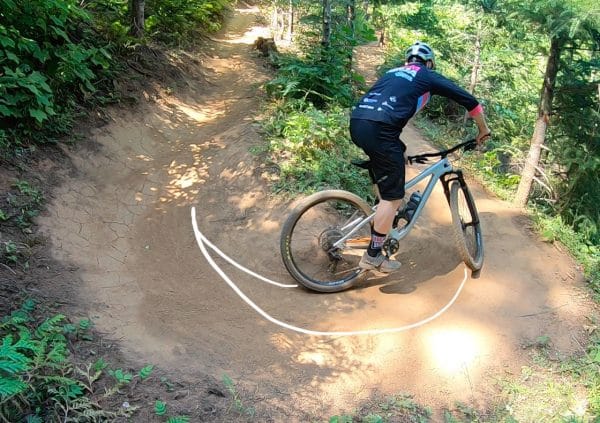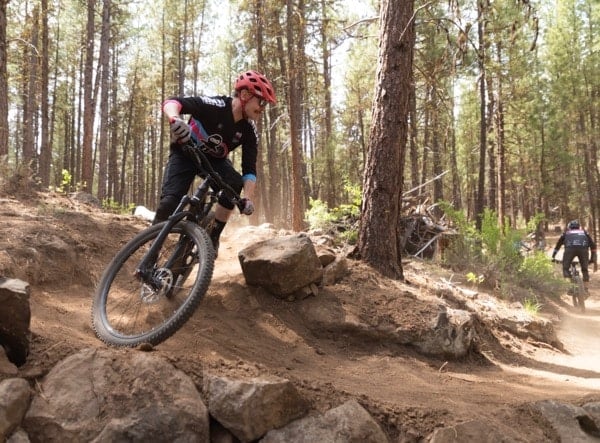Picture this: it’s the exact moment that you settle into the flow of a descent when the singletrack throws a hard left or right at you. You lay on the brakes, eek your way around the turn, pedal like mad to get back up to speed and do your best to find your rhythm again… sound familiar?
You’re not alone. It’s one of the most common questions we get asked:
How the heck do I keep my flow and momentum through corners and switchbacks?!
– Every rider ever
Meet the Pre-Turn – a game-changing technique that’s the key to smooth, fast corners. Are you ready?!
Let’s say you’re approaching a left-hand corner or switchback. What are your line options?
1. Inside line
If you approach the corner from inside line (left side of the trail), it will be considerably tighter and sharper and you’ll be unable to carry momentum through it. Plus, your rear wheel always tracks even further inside than your front wheel where it can slip (as shown in the video) or get hung up on an obstacle like a rock or root.

2. Outside line
If you approach the same corner from the outside line (right side of the trail), it will increase the corner’s radius making the corner wider and therefore faster. But beware! There are often sketchier conditions on the outside line such as loose dirt with less traction or broken off trail edges. Additionally, it doesn’t leave you room to go wider if you mis-calculate your speed or the corner’s radius (as shown in the video) – there’s no buffer zone.
3. Pre-Turn
If you’re wondering “what the heck is a pre-turn?” you’re not alone. It’s a turn in the opposite direction of the corner that moves the apex earlier in corner.
Try this:
- Approach on the inside line of the corner
- Prior to the apex, turn right (opposite the direction you intend to turn)
- Transition smoothly into a left turn

Putting these two turns together, the first being a “pre-turn” and the second being the direction of the corner, makes for a very smooth, controlled corner.

Keys to success
Bike-body separation – Separate yourself from the bike by swinging your hips to the outside of the corner and keeping your knees wide to allow the bike to lean beneath you. This separation will naturally allow your outside foot to come to the down position which leads us to…
Footwork – Your outside foot should be down opposite the direction you’re leaning the bike. So, in this case of a left corner, your left foot should be down for the pre-turn, then as you transition to the actual turn, your right foot should be down. Focus on the smooth application of this footwork

It’s a Mystery
While we have no simple explanation of why, two turns back-to-back is wayyyyy smoother than any one turn. And for some unknown reason, when you add a pre-turn you’ll shift your focus from dragging your brake into the corner into good footwork and compression… and that means SMOOTH and FAST!


